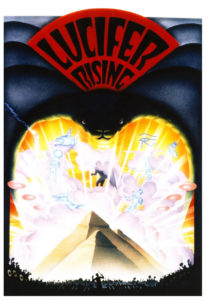 An unabashedly celebratory take on the ritual magic of the late Aleister Crowley by one of his foremost disciples: filmmaker Kenneth Anger. LUCIFER RISING is Anger’s magnum opus, a hypnotic free-form phantasmagoria par excellence.
An unabashedly celebratory take on the ritual magic of the late Aleister Crowley by one of his foremost disciples: filmmaker Kenneth Anger. LUCIFER RISING is Anger’s magnum opus, a hypnotic free-form phantasmagoria par excellence.
First off, the Lucifer of the title is not the one the Christians refer to. Kenneth Anger is referencing the bringer of light as represented by the planet Venus. In this film Lucifer is evoked in human form through the “magick” of Aleister Crowley, of whom Kenneth Anger was an enthusiastic adherent (Anger: “I’m engaged in a long-term selling campaign. I have one product that I’m selling: the 20th Century’s most misunderstood genius…Aleister Crowley”).
LUCIFER RISING was the most expensive of Anger’s films, and had the lengthiest inception. Filming began in 1967 in San Francisco’s Haight-Ashbury district, only to be derailed when the majority of the film was stolen (Anger assembled the remaining footage into the 11-minute INVOCATION OF MY DEMON BROTHER in 1969).
In 1970 a new version of LUCIFER RISING was initiated. It ended up taking over ten years to reach fruition. In 1973 Anger created a 25-minute version with music by Led Zeppelin’s Jimmy Page; this was to be the first part of a much longer film that was never completed. Instead Anger shot some additional footage and added several optical effects to arrive at a 28-minute final edit in 1981, with music by ex-Manson family member Bobby BeauSoleil.
The setting is Egypt, where the Goddess Isis signals Osiris, the lord of death. The two communicate from two distant points by raising their respective talismans. Their communication attracts the attentions of an earthbound high priest, who engages in a ritual in which he slashes his wrists and expires in his bathtub.
This in turn awakens the Goddess Lilith from a sarcophagus in Egypt. She performs a rite before the Sphinx that alerts six German priests, who ascend an ancient solar temple at night. Lilith ascends the same temple in the daylight and performs yet another invocation, which alerts yet another distant individual: the Lord of Chaos, located in England. Luckily this individual is quickly banished, paving the way for the appearance of Lucifer, a hippie-ish dude wearing a leather jacket. He’s given a birthday cake that explodes; the reverberations of this occurrence continue through the centuries until flying saucers(!) appear over Egypt.
One would have to be an Aleister Crowley initiate to fully (or even partially) comprehend this film—which to those in the know, according to Kenneth Anger, is actually quite simple, like “a children’s fairy tale.” As a visual poem of light and color the film is dazzling, and often downright hypnotic. All the colors were carefully chosen for their specific associations, as were the frequent dissolves, wipes and optical effects. There isn’t a single wasted image or gesture in the entire film, which is as ruthlessly streamlined as any ever made.
The subject is ancient pre-Christian gods replacing the current ones, and the atmosphere shimmers with prehistoric mysticism, even as the action shifts from past to present, often simultaneously juxtaposing the two. As a wordless exercise in pure montage LUCIFER RISING is particularly evocative, with erupting volcanoes, Egyptian deities, magicians, ancient monuments and bodies of water all given equal prominence.
The film also contains one of the best-ever soundtracks for an Anger film, courtesy of the incarcerated Bobby BeuSoleil. The acoustics may not be top notch—the score was recoded in Tracy Prison with a band composed of fellow convicts and instruments hand-crafted in the prison hobby shop—but the music is as eerie and hypnotic in its own manner as the images. It all adds up to a profound trance-like evocation of light and sound by one of the American cinema’s true masters.
Lucifer Rising Soundtrack
Vital Statistics
LUCIFER RISING
Puck Film Productions
Director/Producer/Screenwriter/Cinematographer/Editor: Kenneth Anger
Cast: Miriam Gabril, Donald Cammell, Haydn Couts, Kenneth Anger, Sir Francis Rose, Marianne Faithful, Leslie Huggins


